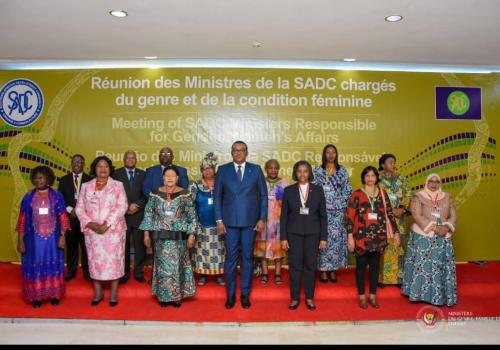The Southern African Development Community (SADC) Committee of Ministers Responsible for Gender and Women’s Affairs convened on the 2nd June 2023, Kinshasa, Democratic Republic of Congo (DRC) to review progress on the implementation of the SADC Protocol on Gender and Development and relevant sectoral programmes, projects and strategies aligned to the Regional Indicative Strategic Development Plan (RISDP) (2020-2030).
The meeting was chaired by Honourable Mireille Masangu Bibi Muloko, Minister for Gender, Family and Children Affairs of the Democratic Republic of Congo and was attended physically by representatives from ten (10) Member States, namely Angola, Botswana, Democratic Republic of Congo, Malawi, Mauritius, Namibia, South Africa, United Republic of Tanzania, Zambia and Zimbabwe.
In his address, His Excellency, Jean-Pierre Lihau, DRC Deputy Prime Minister and Minister for the Civil Service and Innovation in Public Administration of the Democratic Republic of Congo, highlighted the efforts made by the DRC to promote gender equality. His Excellency said that DRC has established a disarmament, demobilisation, community, and social rehabilitation programme in response to armed conflict, for which the government is advocating greater participation by women.
The SADC Deputy Executive Secretary for Corporate Affairs, Ambassador Joseph Nourrice, welcomed all ministers on behalf the Executive Secretary, His Excellency Mr Elias M. Magosi and highlighted that the well-intended efforts towards gender equality and women’s empowerment cannot be achieved without the meaningful representation and participation of women in politics and decision-making. Ambassador Nourrice further highlighted that domestication of Articles 5, 12 and 13 of the SADC Protocol on Gender and Development, will foster transformations that will yield the desirous impact and results in terms of achieving gender parity in women in politics and decision-making in the SADC Region.
Articles 5, 12 and 13 of the SADC Protocol on Gender and Development stipulates that Member States shall ensure that there is equal representation and participation of women and men in decision making positions and for them to adopt strategies to enable women to have equal opportunities with men to participate in all electoral processes.
The Chairperson of the Meeting, Honourable Muloko, called on the Ministers to put in place structures and mechanisms to accelerate the implementation of the commitments to gender equality, equity, and empowerment of women, which is central to the SADC Protocol on Gender and Development. The Chairperson further called on the Ministers to introspect on how far the region has come, in turning the 2030 Agenda into results that benefit women and girls. The Chair reinforced the need to capacitate national gender machineries through strengthening of structures, mechanisms, and processes to guide mainstreaming of gender for achievement of greater equality and equity.
The Chairperson also urged Ministers to strengthen efforts to lobby, advocate, raise awareness, and mobilise resources to advance women’s equal representation in politics and decision-making bodies. “We need to create positive enabling environments including political will at the highest levels as well as legal and administrative frameworks that are conducive to gender equality, Hon. Muloko said.
The following are some of the key outcomes of the Meeting:
a) The SADC Gender-based Violence (GBV) Scorecard was approved to facilitate tracking and monitoring the implementation of the SADC Regional Strategy and Framework of Action for Addressing GBV.
b) Ministers noted progress on implementation of the following SADC Gender Programmes:
i) The SADC Industrialisation and Women’s Economic Empowerment Project (IWEE Project), with the support of the German Government, and urged Member States to support the funded projects initiatives that aim to build capacity of women entrepreneurs.
ii) The United Nations Security Council Resolution (UNSCR) 1325 on Women, Peace, and Security, where only six (6) Member States; Angola, Democratic Republic of Congo, Malawi, Mozambique, Namibia and South Africa have developed national action plans on Women, Peace and Security. The Meeting encouraged outstanding Member States to develop the national action plans to promote women’s participation in peace processes.
iii) The performance on women’s participation in parliament and cabinet and noted that Namibia and South Africa were the only Member States that reached parity in Cabinet in 2022, while some Member States showed constant positive trends, and others were losing their gains in facilitating gender parity in politics and decision-making positions.
The SADC Regional Strategy and Framework of Action for Addressing Gender-based Violence (2018-2030) with an emphasises on strengthening effective GBV prevention and mitigation programmes. The status of GBV through reported GBV cases was also noted That GBV continues to affect more females than males, with right Member States registering that between 67% to 97% of the reported cases affect women and girls. Violence against women and girls remains common in the Region. The meeting of Ministers was preceded by the meeting of SADC Senior Officials from Ministries and Departments of Gender and Women’s Affairs on the 30-31st May 2023, chaired by Mrs. Esther Kamwanya BIAYI, General Secretary of the Ministry of Gender, Family and Children’s Affairs in the DRC.

